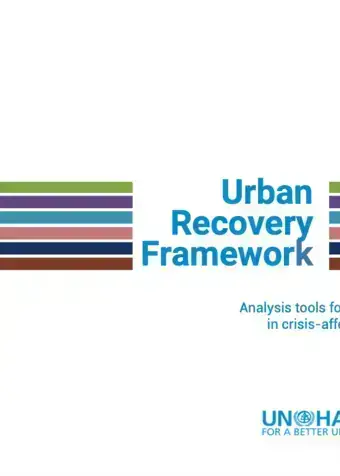Urban Profiling Toolbox
Urban profiling is a methodology implemented in various conflict-affected countries in the region. Through urban profiles, UN-Habitat seeks to provide up to date, holistic documentation and analysis of the impact of the crisis in key cities, synthesising information and insight from existing sources and priority sectors, supplemented by direct field research by UN-Habitat teams based in each city. This document has been developed with the goal to assist practicioners in implementing urban profiles in conflict-affected countries. It consists of two parts: an analysis toolbox and an analysis framework.
The Urban Recovery Analysis Framework has been developed to support the development of an urban profile through a shared set of research questions that examine:
- How conflict has affected the city;
- What the relief phase challenges are and how they will impact the development phase;
- What strategic areas or projects require attention in the short-medium timespan.
The Urban Recovery Analysis Framework aims to:
- Establish a baseline for urban functionality and quality of life;
- Determine the most affected and most in need neighbourhoods in the city;
- Identify opportunities for multi-sector interventions (humanitarian and recovery) by UN- Habitat, stakeholders and other actors using an area- based approach and action plans;
- Explain how investments and priorities can aid peacebuilding and reconciliation agendas;
- Engage local stakeholders in a progressive process of knowledge-building of the city; and
- Strengthen communication of needs and negotiation position of local government towards central government and humanitarian/development actors.
DESIGN OF THE FRAMEWORK
This analysis framework has been developed with the understanding that different cities can differ greatly in terms of size and density; whether they might be fragile or in a state of conflict; by the drivers of conflict that may be present; and by the development challenges they face. Due to these varying factors, this framework is not a comprehensive methodology, nor does it provide a step-by-step process for implementing an urban profile. Rather, it provides a starting point, tools and learning for practitioners faced with implementing a profile on the ground. Furthermore, this framework takes into consideration the recommendations put forward in the paper entitled “Urban Profiling For Better Responses To Humanitarian Crises”.
The urban profiles developed under this framework should attempt to address the majority of its primary research questions, which are intentionally formulated in a general way for each of the pillars shown in Figure 1. These research questions have been formulated based on UN-Habitat’s extensive experience with urban profiles in different contexts. This gives space for individual profiles to determine the relative emphasis placed on, and effort to be devoted to the different research questions. The research questions themselves can form the basis for Terms of References for independent researchers that are mobilized for developing the urban profile, and as a checklist to ensure the profile has covered all relevant topics. Each research question has a non-exhaustive list of suggested products and indicators that have proven to be useful in the development of past profiles.
Tools to support the implementation of profiles:
A ‘toolbox’ is attached to this framework. It contains the necessary guidance for analyses that have been implemented in previous urban profiles.
Alignment with existing frameworks:
The frameworks pillars are based on the ongoing work on Urban Recovery Frameworks, currently being developed within UN-Habitat’s Regional Office for Arab States (ROAS), due to its extensive urban profiling experience in the region, including in Syria, Libya and Yemen. A regional approach was initiated to learn from similar contexts in the region.
